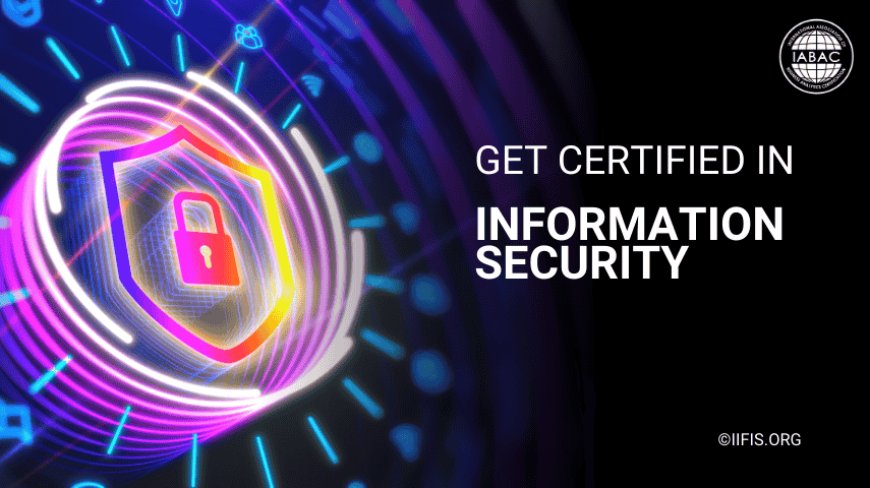Why Get Certified in Information Security
Discover the benefits of getting certified in information security, from career growth and higher earning potential to skill validation and enhanced job security in a rapidly growing field.

In today’s digital age, cyber threats are evolving at an unprecedented rate, making information security more crucial than ever. Whether you’re an IT professional looking to advance your career or a business owner aiming to protect your organization, getting certified in information security can be a game-changer. Certifications not only validate your skills but also open doors to new opportunities, enhance your credibility, and equip you with the knowledge to safeguard sensitive data against cyberattacks. In this blog, we’ll explore the key reasons why earning a certification in information security is a smart investment for your future.
Growing Demand for Cybersecurity Experts
-
Industry Growth:
-
Rapid expansion of cybersecurity due to increasing cyber threats (e.g., ransomware, data breaches).
-
Cybercrime projected to cost $10.5 trillion annually by 2025.
-
Growth in cloud computing, IoT, and remote work has expanded attack surfaces.
-
Talent Gap:
-
Global shortage of 3.4 million cybersecurity professionals (2022).
-
High demand for roles like security analysts and ethical hackers.
-
Skills gap leads to competitive salaries and job security.
-
Opportunities Across Industries:
-
Cybersecurity needed in finance, healthcare, retail, government, and more.
-
Financial institutions and healthcare systems are frequent targets.
-
Growing reliance on digital infrastructure across all sectors.
Key Benefits of Getting Certified in Information Security:
-
Career Advancement:
-
Certifications help you stand out among other candidates.
-
Increases opportunities for promotion and leadership roles.
-
Higher Earning Potential:
-
Certified professionals typically earn higher salaries than non-certified peers.
-
Skill Validation:
-
Validates technical skills and specialized knowledge in cybersecurity.
-
Ensures up-to-date knowledge, as certifications often require renewal and ongoing education.
-
Job Security:
-
High demand in the growing cybersecurity field leads to greater job security for certified professionals.
-
Global Recognition:
-
Many certifications are globally recognized, offering career mobility and opportunities in various countries.
Top Information Security Certifications
-
Certified Information Systems Security Professional (CISSP):
-
Overview: Recognized globally, CISSP validates expertise in designing and managing security programs.
-
Benefits: Ideal for experienced security professionals aiming for leadership roles.
-
Certified Ethical Hacker (CEH):
-
Overview: Focuses on ethical hacking and penetration testing.
-
Benefits: Equips professionals with skills to think like hackers and enhance system security.
-
CompTIA Security+:
-
Overview: Entry-level certification for beginners in cybersecurity.
-
Benefits: Covers essential security concepts, making it a great starting point for newcomers.
-
Certified Information Security Manager (CISM):
-
Overview: Focuses on information security management and governance.
-
Benefits: Ideal for senior professionals in leadership or management roles within cybersecurity.
-
Overview: Focuses on auditing, control, and assurance in IT security.
-
Benefits: Great for professionals interested in IT auditing and security compliance.
Aligning Certifications with Career Goals

- Entry-Level Professionals:
-
-
For those new to the field, certifications like CompTIA Security+ are ideal.
-
These certifications cover foundational cybersecurity skills, making them a great starting point for beginners aiming to enter the industry.
-
-
Mid-Level Professionals:
-
Certifications such as Certified Ethical Hacker (CEH) and Certified Information Security Manager (CISM) are suited for professionals looking to deepen their expertise.
-
These certifications help expand knowledge in ethical hacking or security management, enhancing career progression.
-
-
Senior-Level or Specialized Roles:
-
For those pursuing leadership or specialized areas, certifications like Certified Information Systems Security Professional (CISSP) or Certified Information Systems Auditor (CISA) are highly beneficial.
-
These credentials validate advanced skills and open doors to leadership positions or specialized roles in auditing, governance, and compliance.
-
How Certifications Build Credibility and Trust
-
Employer Trust: Certifications demonstrate that candidates possess a standardized, recognized level of knowledge, giving employers confidence in their skills and expertise. This ensures that certified professionals meet industry benchmarks and are capable of handling cybersecurity challenges effectively.
-
Client Assurance: For consultants and freelancers, certifications act as a proof of credibility, offering clients reassurance that they are working with someone who has verified expertise. This trust can lead to stronger client relationships and more business opportunities.
-
Peer Recognition: Earning certifications garners respect and recognition within the professional community. It signals a commitment to staying current in the field, which can lead to career networking opportunities and greater professional influence.
Staying Updated in a Constantly Evolving Field
-
Evolving Threats: The cybersecurity landscape is continuously shifting due to the emergence of new and more sophisticated cyber threats. Staying ahead of these challenges requires professionals to adapt and enhance their skills regularly.
-
Ongoing Education: Many certifications mandate ongoing education and renewal, ensuring that professionals remain current with the latest industry standards, tools, and best practices. This helps maintain a high level of proficiency and preparedness for evolving cybersecurity issues.
-
Networking Opportunities: Certification bodies often provide exclusive access to communities, conferences, webinars, and other resources. These platforms offer valuable opportunities for professionals to network, exchange knowledge, and stay informed about the latest trends and technologies in cybersecurity..
Getting certified is more important than ever. Certifications provide career growth by opening doors to new opportunities, offer skills validation that sets you apart from non-certified professionals, and ensure job security in a high-demand field. Whether you're just starting or advancing your career, certifications can play a crucial role in reaching your professional goals.
Explore the various certification options available, from CompTIA Security+ to CISSP, and take the next step toward building a successful and secure future in information security. The Institute of Information, Innovation & Security (IIFIS) also offers valuable resources to help guide you on your certification journey. Now is the time to invest in your professional development and make a lasting impact in the cybersecurity world.
























